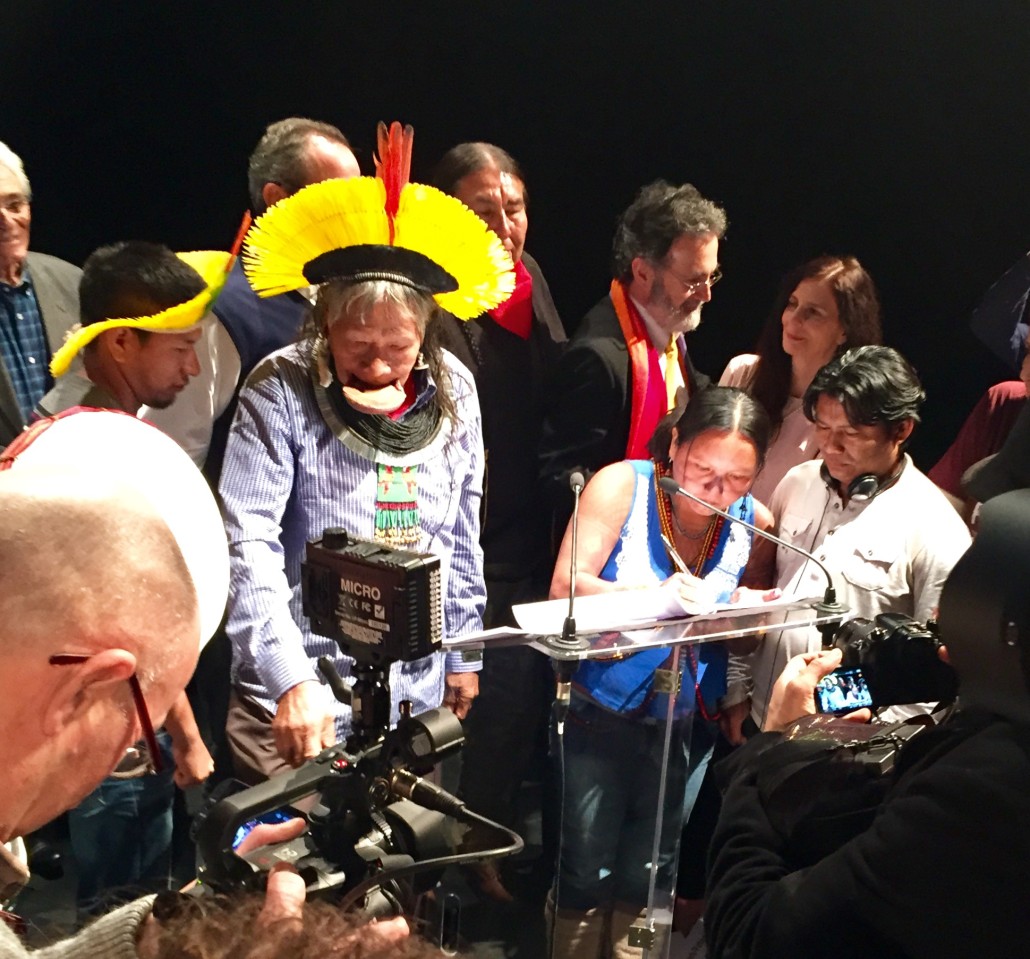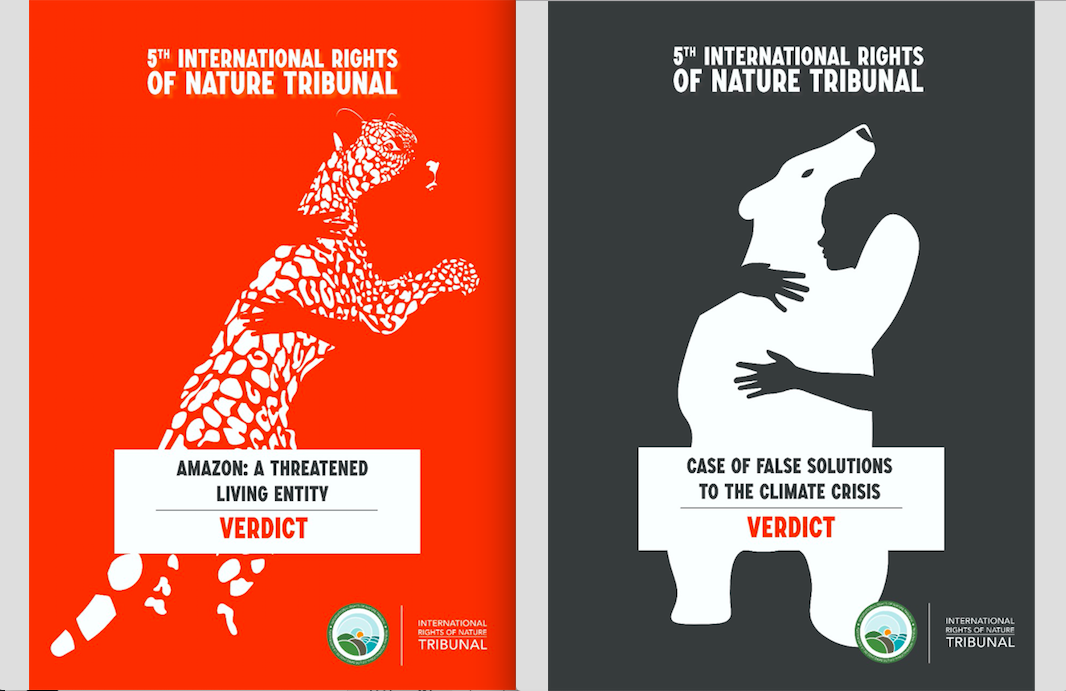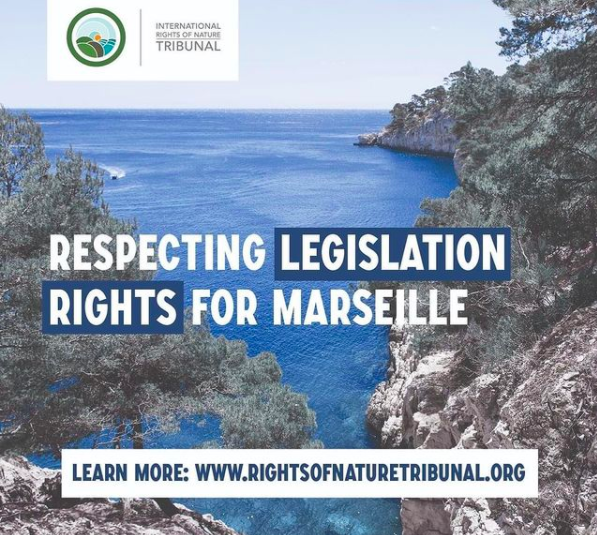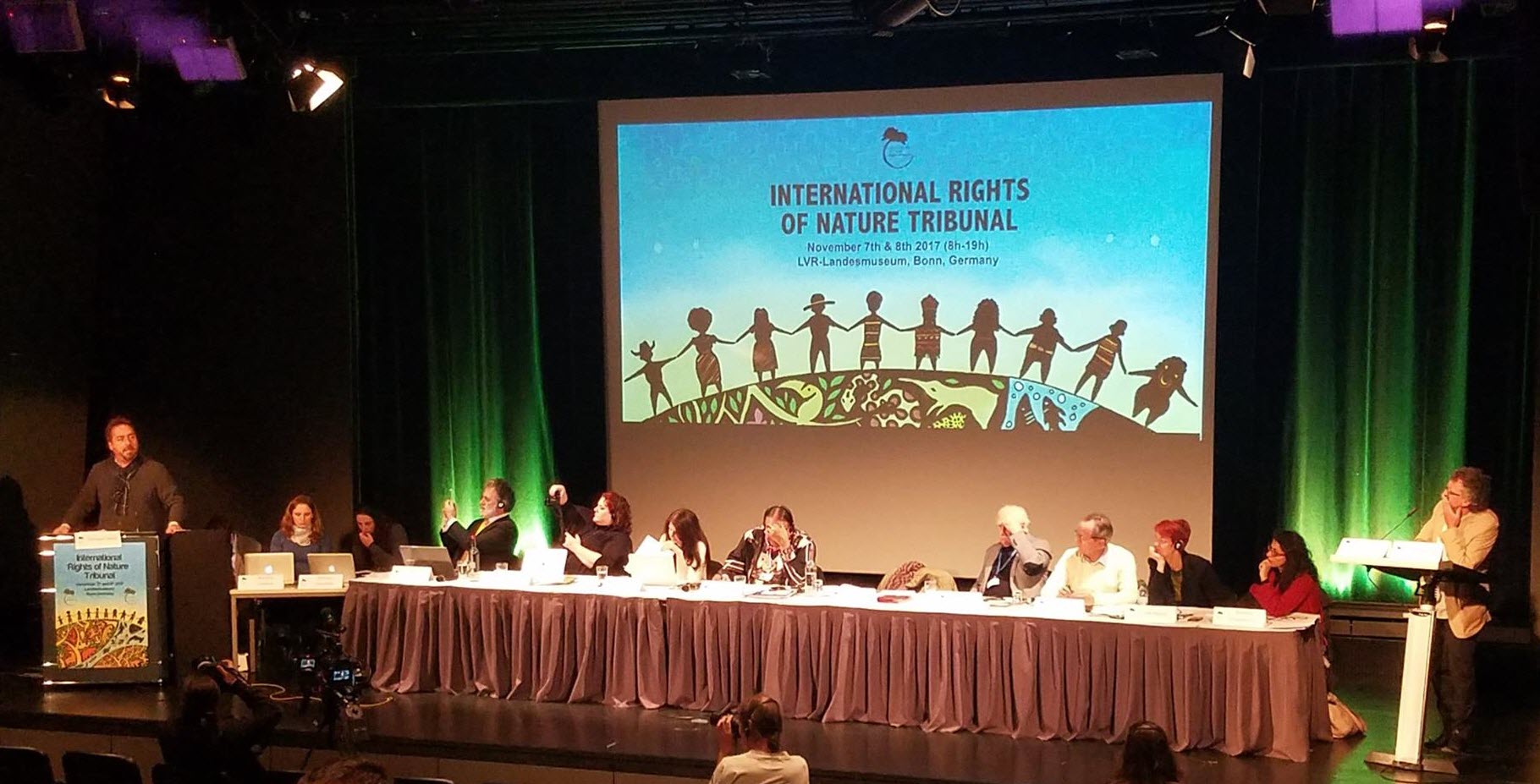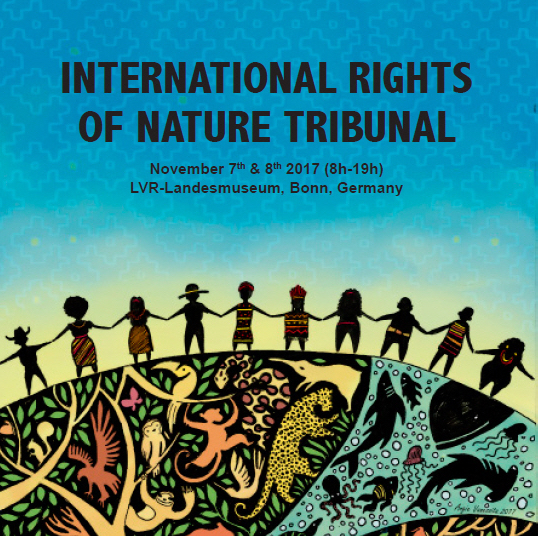For the Establishment of the International Rights of Nature Tribunal
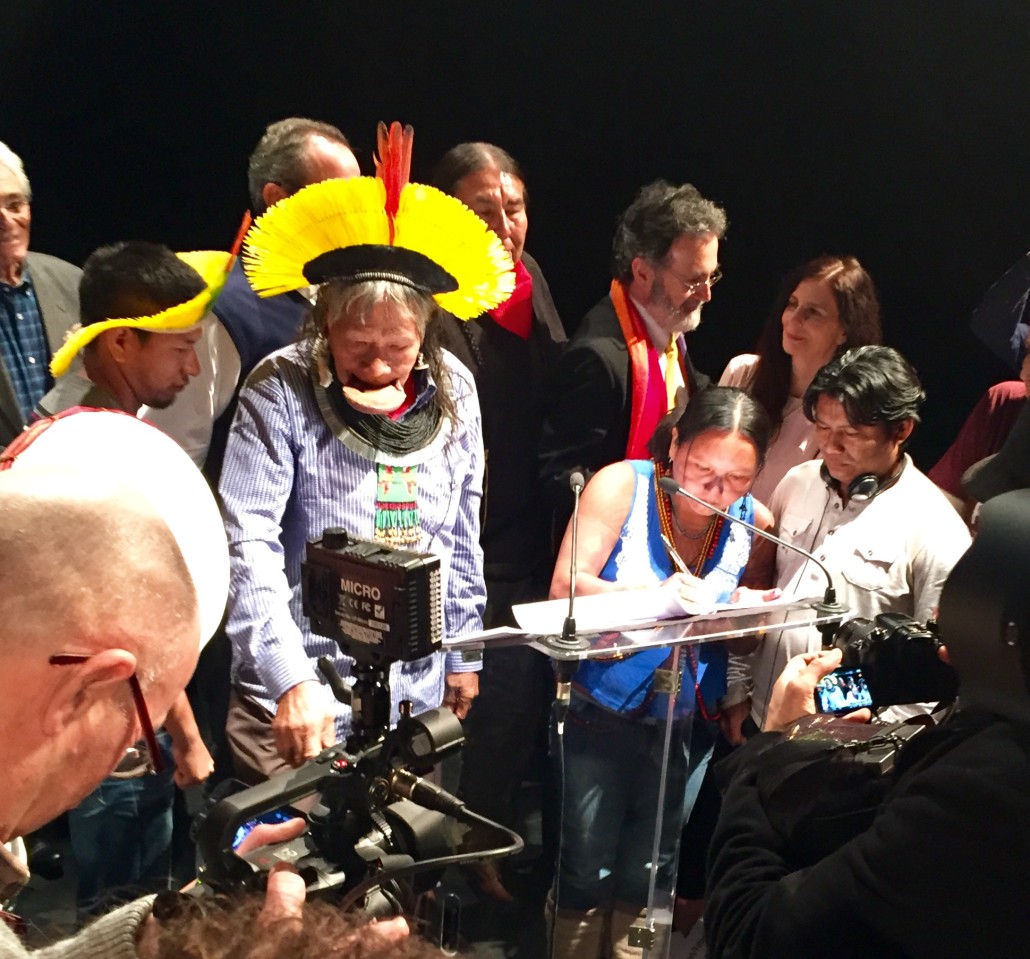
Signed December 2015 ~ Paris, France ~ Printable Tribunal Convention
Preamble.
Article 1. Establishment of Tribunal
Article 2 Purpose of Tribunal
Article 3 Constitution of Tribunal
Article 4 Secretariat
Article 5 Earth Defender’s Office
Article 6 Members of Tribunal
Article 7 Electoral College
Article 8 Regional chambers of Tribunal
Article 9 Signatories to the Convention
Article 10 Register of Parties
Article 11 Conference of Parties
Article 12 Finances
Article 13 Transitional Arrangements
Article 14 Interpretation
Article 15 Entry into force of Convention
Preamble
We, the peoples and nations of Earth:
understanding that we are all part of Earth, an indivisible, living community of interrelated and interdependent beings with a common destiny;
conscious that the economic, political, legal and social systems established by the industrial and consumerist cultures that dominate the world today are putting life as we know it at risk through phenomena such as climate change, ocean acidification, desertification, the destruction, degradation and pollution of ecological communities and the mass extinction of species;
recognising that international and national legal systems and institutions have proved to be inadequate to protect Earth and the rights of all beings, including human beings and future generations;
determined to take urgent, decisive, and collective action to transform structures and systems that are threatening the health, integrity and functioning of many beings who are an integral part of Earth;
responding to the mandate from the World People’s Conference on Climate Change and the Rights of Mother Earth, convened in Tiquipaya Cochabamba Bolivia in April 2010, and in particular to:
(a) the call in the Indigenous People’s Declaration adopted on 21 April, 2010 for the establishment of a climate justice tribunal with the full and effective participation of indigenous peoples, and their principles of justice;
(b) the call in the Final Declaration of the World People’s Conference on Climate Change and the Rights of Mother Earth for the establishment of an International Climate and Environmental Justice Tribunal; and
(c) the proclamation of the Universal Declaration of the Rights of Mother Earth on 22 April 2010;
wishing to promote the universal and effective recognition and observance among all peoples of the rights recognized in the Universal Declaration of the Rights of Mother Earth (“the Earth Rights Declaration”) as a means of promoting a respect and reverence for all life among all humanity, which is essential to restore harmonious co-existence between humans and other beings and the well-being of current and future generations;
convinced that this is the appropriate time to establish an international tribunal to hear cases involving allegations of severe violations of the Earth Rights Declaration, and if those allegations are proved, to make findings and rulings and deliver opinions on the action that should be taken to ensure that the health and integrity of any ecological community harmed by those violations is, as far as possible, restored and future harm is prevented;
do hereby establish the International Rights of Nature Tribunal in accordance with provisions of the articles of this Convention.
do hereby establish the International Rights of Nature Tribunal in accordance with provisions of the articles of this Convention.
Article 1. Establishment of Tribunal
(1) The International Rights of Nature Tribunal is formally established with effect from 4 December 2015.
(2) The Tribunal is established as an international people’s organisation which derives its mandate and powers from the people represented by the signatories to this Convention.
Article 2 Purpose of Tribunal
The Tribunal is established:
(a) to investigate, hear and decide cases involving alleged violations of the Earth Rights Declaration;
(b) to further develop Earth jurisprudence by writing and disseminating judgements that interpret the Earth Rights Declaration and apply the rights and obligations in it to the specific facts of the cases which it hears;
(c) to promote both universal acceptance among the peoples of the world that they have a duty to respect the intrinsic rights of all natural beings, and universal observance of the rights and duties contained in the Earth Rights Declaration; and
(d) to demonstrate how the application of the rights and duties in the Earth Rights Declaration promote the harmonious co-existence of humans and other beings in a manner that enhances the integrity, health and functioning of the whole Earth community.
Article 3 Constitution of Tribunal
(1) The Tribunal must function in accordance with Statutes and Rules of Procedure.
(2) The Statutes of the Tribunal must be adopted by a resolution passed by a majority of either:
(a) the Parties present in person or by proxy at a meeting of the Conference of the Parties; or
(b) the members of the Tribunal who are present in person or by proxy at a meeting of the Tribunal.
(3) The Statues of the Tribunal may be amended at any time after their adoption by a resolution referred to in paragraph (2) above.
(4) The Tribunal may adopt a resolution to amend the Statutes or to change the composition of the Tribunal provided that it presents any such resolution to the Conference of the Parties for consideration at its next meeting. The Conference of the Parties, may approve, amend or over-rule the resolution made by the Tribunal.
(5) The secretariat must periodically review the Statutes and any rules of procedure adopted by the Tribunal and make proposals for improving them to the Conference of the Parties and the Tribunal.
Article 4 Secretariat
(1) The Tribunal shall have a secretariat that is responsible for the administration and management of the affairs of the Tribunal.
(2) The Secretariat must be managed by a Secretary General who is answerable to the members of the Tribunal.
(3) The first members of the Tribunal must appoint the first Secretary General.
(4) The Secretariat may establish regional secretariats headed by regional secretaries-general, to assist it.
Article 5 Earth Defender’s Office
(1) The functions of the Earth Defender’s Office are:
(a) to investigate and report on potentially serious violations of the Earth Rights Declaration;
(b) to initiate cases before the Tribunal if the Earth Defender believes that doing so is justified and appropriate;
(c) to represent Earth in any mediation, restorative justice or other proceedings related to a case before the Tribunal that do not take place before the Tribunal;
(d) to lead evidence before the Tribunal and to manage the leading of evidence by the other Parties; and
(e) to make representations to the Tribunal in relation to the case before it, including advancing legal arguments and proposing appropriate measures to promote restorative justice.
(2) The Earth Defender must be assisted by a Deputy Earth Defender and by any other person appointed by the Earth Defender to assist the Earth Defender’s Office.
(3) Subject to article 13, the Electoral College elects the Earth Defender and any Deputy Earth Defender.
Article 6 Members of Tribunal
(1) Subject to article 13(1), the Electoral College elects the members of the Tribunal.
(2) The Tribunal must be headed by a President.
(3) There must be a minimum of three and a maximum of 30 members of the Tribunal at any time.
(4) Members of the Tribunal shall hold office for a term of three years but may be re-elected.
(5) Each case must be heard by a panel consisting of a minimum of three members of the Tribunal and the decision of the panel shall be the decision of the Tribunal.
Article 7 Electoral College
(1) The President of the Tribunal must, after giving reasonable notice to the Parties, convene an Electoral College at least once every three years.
(2) The Electoral College consists of the following:
(a) a current or former member of the Tribunal appointed by the President of the Tribunal;
(b) a member appointed by the Conference of the Parties at their last meeting;
(c) one member from each of the following regions appointed jointly by the Parties whose seat or head office is in that region: Africa; Asia; Australasia and Antarctica (including the Pacific islands); Europe; North and Central America; and South America and the Caribbean; and
(d) one member appointed jointly by Parties who work specifically on the conservation and protection of oceans and marine areas.
(3) The failure by any person or group of Parties to appoint a member of the Electoral College by the date stipulated by the President shall not affect the validity of the establishment of the Electoral College.
(4) The Electoral College must appoint members of the Tribunal by secret ballot from a list of candidates nominated by Parties and circulated by the Secretariat to the members of the Electoral College at least 10 days before the vote is taken.
Article 8 Regional chambers of Tribunal
(1) Parties to the Convention from a specific geographic area or biome may establish a chamber of the Tribunal and appoint members of that chamber in order to hear cases specific to that area or biome.
(2) A chamber of the Tribunal must be established and must function in accordance with the rules and requirements that are prescribed either in the Statutes or in any statutes adopted by that chamber in accordance with the Statutes.
(3) A chamber may adopt its own statutes to regulate its proceedings provided that the statute complies with any requirements specified in the Statutes and that a copy of those statutes (and any amendments that may be made to it from time to time) is lodged with the Secretariat.
Article 9 Signatories to the Convention
(1) This Convention may be signed:
(a) on behalf of a nation, tribe or other traditional group of indigenous peoples, by a person who is authorised in accordance with the laws and customs of those peoples, to represent them;
(b) on behalf of the members of any organisation that wishes to promote the effective implementation of the rights and duties in the Earth Rights Declaration in respect of a specific geographical area or areas, or any specific being or beings (e.g. rivers, or species), by a duly authorised representative of that organisation;
(c) on behalf of any population of people who reside within a particular area, by a person whom they have elected or is authorised in accordance with the laws and customs of those peoples, to represent them.
(2) This Convention is signed by delivering a letter of commitment to the Secretariat.
(3) A Party may withdraw from the Convention by delivering a letter of withdrawal to the Secretariat.
Article 10 Register of Parties
(1) The Secretariat must maintain a register of parties to the Convention.
(2) Any three or more parties to the Convention may make written submissions to the Secretariat requesting the Tribunal to remove a party from the register of parties on the basis that that party has acted in a manner that will bring the Tribunal into disrepute or that is seriously prejudicial to the operation of the Tribunal.
(3) The Secretariat must give the party concerned a reasonable opportunity to make representations as to why it should not be removed from the register, before referring the matter to the Tribunal for a decision.
Article 11 Conference of Parties
(1) The Conference of the Parties consists of all the parties on the register at the relevant time.
(2) The Secretariat must convene a meeting of the Conference of the Parties at least once every three years and must ensure that members who are not able to attend in person are given a reasonable opportunity to contribute to the deliberations of the Conference of the Parties.
(3) A resolution supported by two thirds of the Parties participating in person or by proxy in a meeting of the Conference of the Parties is binding on the Secretariat and the members of the Tribunal.
Article 12 Finances
(1) The Conference of the Parties must provide or raise the funds necessary to finance the implementation of this Convention including the means to finance the Secretariat, the meetings of the Tribunal and the Conference of the Parties.
(2) The Conference of the Parties must establish a Funding Committee of one or more Parties to work with the Secretariat to prepare budgets and to raise funds from contributions by Parties, donations and other means consistent with the purpose of the Tribunal.
(3) Each Party must use its best endeavours to make a contribution to the funding of the Tribunal and the Secretariat.
Article 13 Transitional Arrangements
The Global Alliance for the Rights of Nature must:
(a) appoint an interim Secretary General until the Tribunal appoints the Secretary General in accordance with article 4(3);
(b) appoint the first members of the Tribunal;
(c) appoint the first Earth Defender and Deputy Earth Defender; and
(d) convene the first meeting of the Tribunal.
Article 14 Interpretation
The Global Alliance for the Rights of Nature must:
(a) appoint an interim Secretary General until the Tribunal appoints the Secretary General in accordance with article 4(3);
(b) appoint the first members of the Tribunal;
(c) appoint the first Earth Defender and Deputy Earth Defender; and
(d) convene the first meeting of the Tribunal.
Article 15 Entry into force of Convention
(1) This Convention enters into force on 4 December 2015.
(2) The Tribunal is empowered to ratify all actions taken in the name of the Tribunal prior to that date as being as valid and effective as if taken by the Tribunal after its establishment.
